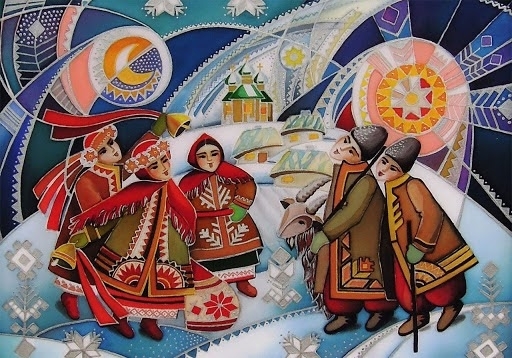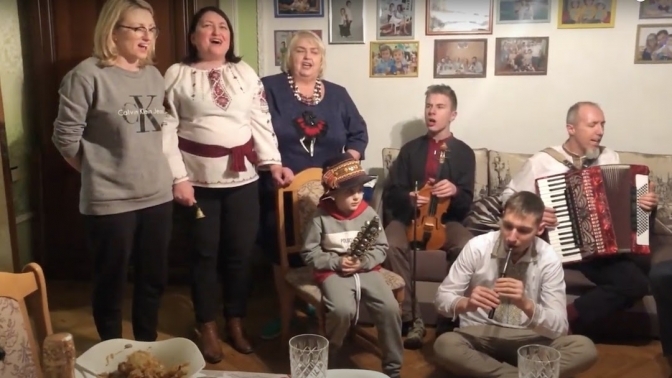
By Joe Lindsley
Around the world, the Shchedrk, or the «Carol of the Bells» – is the most well known Ukrainian Chriatmas song (Spotify) but if you can find your way to Galicia, west Ukrainian, you will uncover so much more, as I realized during three days of what seemed to be infinite, time – expanding festivities.
My friends, the Dulyshes, a family of musicians, gave me simple instructions: On Christmas Day, 7 January, take the train from Lviv to the city of Stryi, 45 miles south to join them for Greek Catholic Christmas. Inexplicably I instead alighted in the ski-town of Slavske, 75 miles away, but this mistake was a good one, because it took me to the heart of Ukrainian Christmas.
My friend, Andrew, a saxophonist in Lviv, and his father Taras, went out of their way to collect me. I apologized for my error, but in that easy-going Galician way, Taras said, no problem: They had friends in a nearby village and so we’d pay a Christmas visit.
Farmhouse Christmas with Lots of Samohonka and Ukrainian Wasabi
Soon we were knocking on the door of a farmhouse and hospitality swiftly swept us inside.
I wore an elaborate felt hat, part of the trad garb of the Hutsul people, given to me by Lviv friends on Christmas Eve. Bemused by this «American Hutsul,» those gathered passed around and tried on the hat while the hostess prepared spaces for us. Within seconds, a shot glass full of samohonka landed in my hands. This is the homemade spirit of western Ukraine, like moonshine but always lovelier than any moonshine I’ve had.
In the city of Stryi, revelers sing «Небо і земля» (Nebo and Zemlya / Heaven and earth) on the second day of Julian calendar Christmas, 8 January 2021 – when the Greek Catholics and Orthodox celebrate the holiday.
The next hour, every five minutes or so it seemed, whenever someone made a toast, budemo, we took our shots and then Taras played his accordion and Andrew a whistle, while all sang the carols that soon would be familiar: «Чудо, чудо! – повідають.» «Chudo, chudo povidayut,» or «miracle, miracle they will tell.»
The repetitive melody – always seeming to strive for something higher and higher and yet still familiar and comfortable: it really was pure, accessible joy, folk joy, the joy of the people.
Thanks to the drink, the room was starting to spin. Oh Lord, I thought, it’s gonna be tough to make it til even 3pm, let alone Christmas dinner an hour away in Stryi. But I had no reason to fear. The solution lay before me: that table full of food.
«Eat, eat! Їсти! Їсти! (yisty!)» everyone encouraged me. At that moment, I decided to let go and see where this Ukrainian Christmas took me. I reached for the bowl of a improving and stomach-saving combination of beet-root and horseradish, aka Ukrainian wasabi – yes, that would keep my head level!
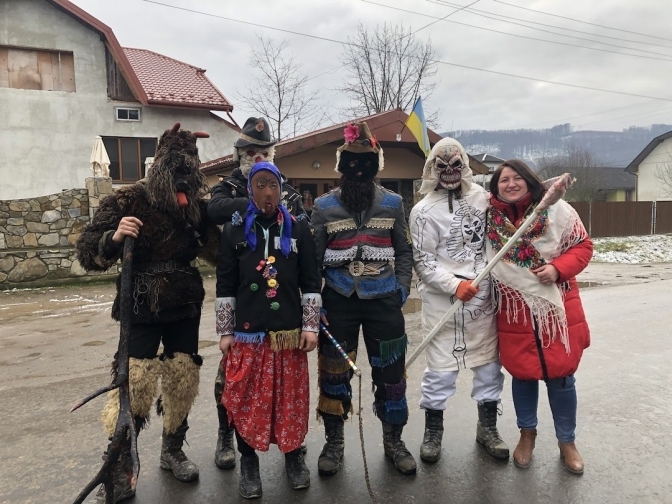
Costumed carolers along the road
Mid-afternoon, après-feast, we drove to the Dulysh apartment in Stryi, stopping en route at a holy well to fill up jugs with water. Stryi is not a quant city: It’s dominated by Brutalist Soviet architecture from the Krushchev era, but within the homes and apartments, especially at Christmas, you could just as well be at a Devonshire inn or a Swiss chalet.
The Neighbors Arrive
Natalia, Andrew’s mother, had laid out a feast – dumplings, borsch, mushrooms, cheeses, meats, and the amazing kutia, the poppyseed porridge served only at Christmas – on a table in the living room and we drank wine and samohonka. Some neighbors and friends joined, including Ulana, a singer, and every ten minutes or so the group would break out into one of the polyphonous carols.
Sporadically the front door would open – I don’t remember people knocking – and families of carolers entered to sing a song before always the youngest among them, like Linus in A Charlie Brown Christmas, recited a bit from the Gospel of Luke. In a mix of trick-or-treat Halloween and Christmas, the hosts would give these carolers sweets and drinks.
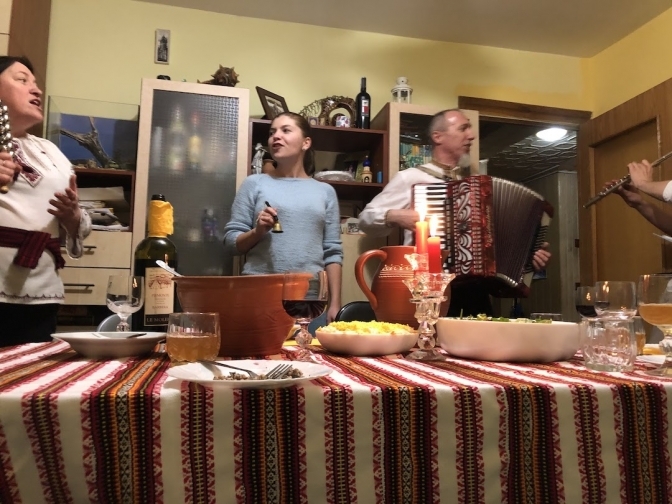
At 11pm, my Ukrainian-speaking hosts were cleaning up and removing the table and preparing for me a bed on the couch. So I assumed it was the end of the day. But then Andrew handed me a small bell.
«Here, bring this with you. But don’t lose it. It’s 100 years old.»
It was nowhere near bed-time.
We bundled up to face the cold and went on to the next dinner, now at the home of Ulana’s parents, both professional musicians. Until maybe 5 in the morning we replicated the same feast we had just enjoyed, except with a different type of mushrooms and this time a piano. Song after song, I felt we were singing against the darkness til we forgot the darkness: a powerful way to launch into the new year, made possible by people who keep alive their culture as a bright spot in the universe.
Throughout the midnight hours, neighbors came by to sing. When one group of carolers saw all the instruments within the room, they hesitated, unsure whether they should play for such professional musicians: a pianist and a music teacher. Nonsense! said our hosts, and all joined in together, every one singing except me, who did not know the songs. I, unmusical, tried to ring the old little bell in tune.
Then, the man of the house, the famed pianist, took to the piano and began the familiar song, «Silent Night.» We sang in English.
The next morning I loaded up in the car with the Dulysh family and as snow fell we drove deep into a forested mountain region to see the massive rocks, skellig dovbush: a good healthy walk and climb. I did not know this but more feasting awaited.
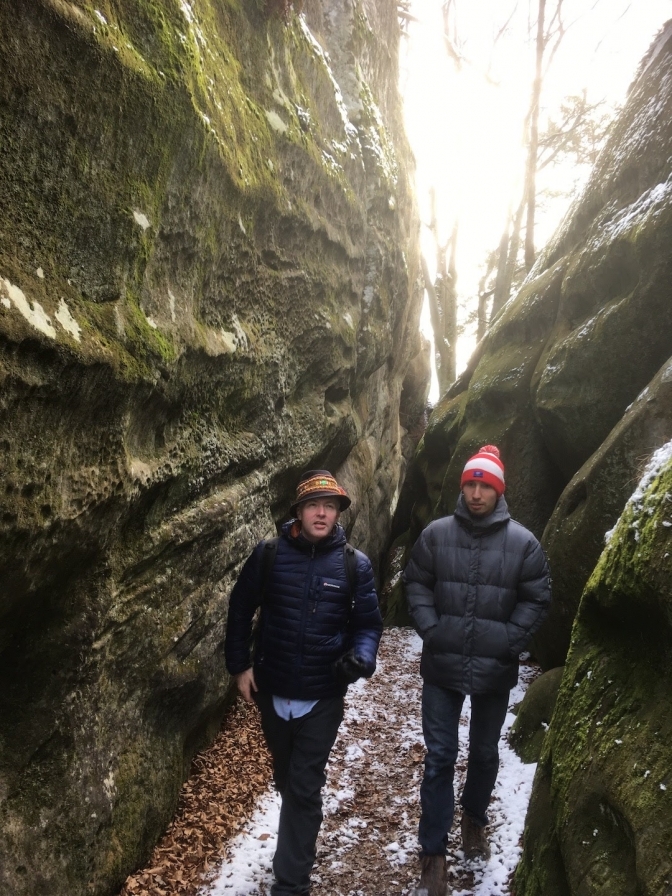
Dovbush rocks
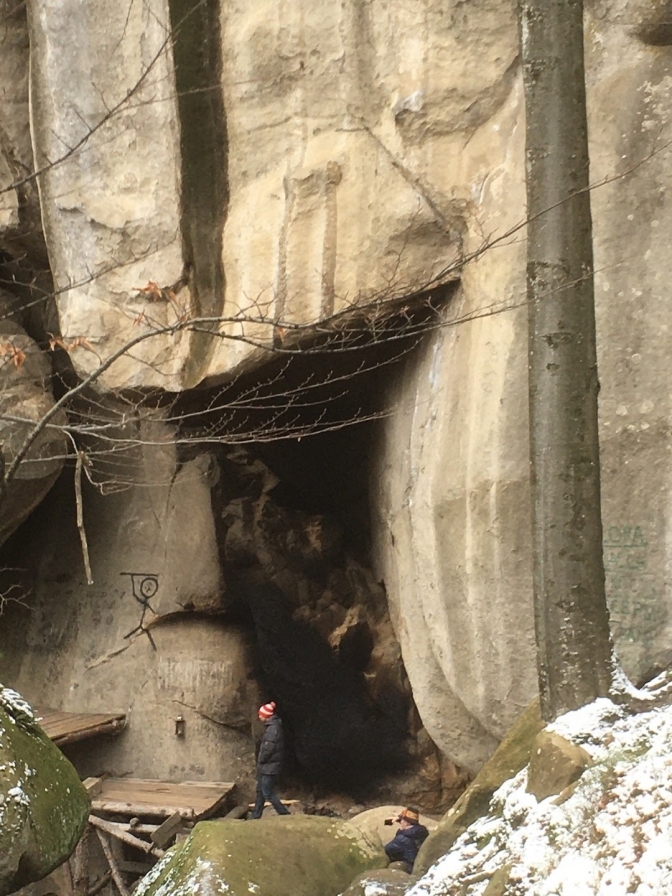
Dovbush rocks
That night, first we stopped at another Soviet-era apartment building, walked up seven flights, knocked on a door: A family appeared, and standing in the dark green-tiled hallway Natalia, Taras, Andrew, and brother Roman, sang a carol in a polyphonic round.
Then we went to a grand new house, almost Middle Eastern-in style. In the shoe hallways we, in the custom, removed our footwear, and introductions flew about. A few Ukrainians who lived in Philadelphia, where I once lived, were back home visiting. Someone distributed songbooks, another refreshed the food platters, and an hour of singing and wine and samohonka sipping ensued.
The Philadelphian Ukrainians were surprised: what was this Irish American doing deep in the heart of Galician Christmas. Well, I got stuck here in the pandemic, etc. They were earning money as truck drivers, and they told me how they needed this annual Christmas visit to Ukraine: They liked America but this missed the soul and culture of their home soil, especially Christmas.
«We need this, to keep going through the year,» one told me.
We went to two or three more houses that night, the second day of Christmas, before our final stop, a house where no one answered when we arrived. And so we climbed over the spiky fence and opened the front door. People welcomed us and suddenly we were in the bedroom of the matriarch, who was in bed. I thought maybe it was a near-death-bed. We said hello to her in the dark and then someone brought us into the bright living-dining room with its giant decorated tree and a table laden with food and drink.
Suddenly the formerly bed-ridden matriarch appeared. She was the opposite of near-death: full of life and vigor, she simply needed a reason to join the party and now there was more food, more mushrooms, more samohonka, more wine--and crucially more beetroot and horseradish. Despite my then-poor Ukrainian, she and I spoke for an hour about Ukraine, America, Soviets, hope, Christmas, everything. As we left, at three in the morning, she gave me an icon of the Virgin Mary.
The Day of the Green Room and the Red Room
The next morning, third day of Christmas: By now it seemed like this time of gifts would never end. It was a day of images and sounds so unusual as to be psychedelic: the day of the green room and the red room.
In the morning in Stryi, we visited Taras’s mother’s home. Everything was green: the cabinets in the kitchen, the rugs upon the floors, the carpets upon the walls, even the cups and plates. We sang «Небо й земля,» and the grandmother recited the gospel words afterward. Surrounded by green, a moment of joy and happiness. She brought me into an even greener room and said, please from here, choose anything you like, like a scene from Willy Wonka. I selected a green embroidered cloth.
In the city of Stryi, the Dulysh family sing «Небо і земля» (Nebo and Zemlya / Heaven and earth) on the second day of Julian calendar Christmas, 8 January 2021–when the Greek Catholics and Orthodox celebrate the holiday.
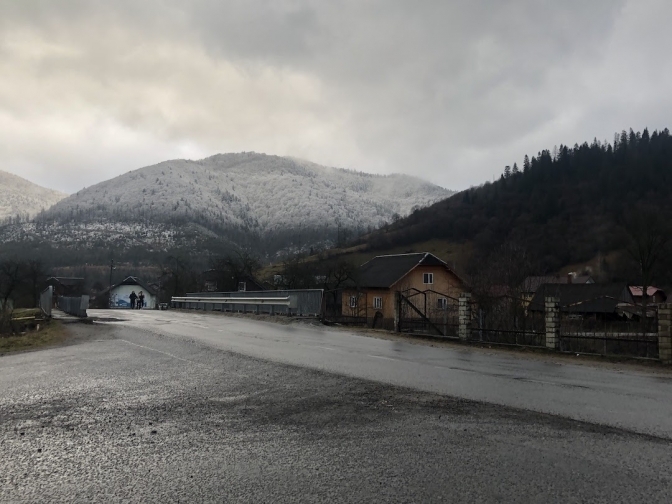
Near Slavske, Ukraine
Then after many hours in the car, filled with much singing and a little napping as we sped through the Galician plains and mountains, we reached Yaremche, the ancient mountain capital of the Hutsul people. A famed Hutsul violinist hosted us in his cottage, were he repairs violins in a room as red as the grandmother’s was green. The rugs upon the floor were red, the carpets upon the walls were red.
And there my friends and the legendary Hutsul music made music: carols, Edith Piaf, folk songs, opera, everything–and the little red room became a grand music hall, an infinite place of possibility. «Appreciating the moments of high art!» said Andrew as we all raised glasses of juice or wine.
In Yaremche, Ukraine, the ancient Hutsul capital in the Carpathian mountains, musicians celebrating Julian calendar Christmas (beginning 7 January) play «Under the Skies of Paris,» a song made famous by Edith Piaf, about the lives of several Parisians, good and bad, in a single day.
Back at my friends’ apartment in the wee hours that night – Stryi is maybe four hours from Yaremche, I don’t know how we made it – while we drank fresh pine needle tea and listened to some jazz on YouTube, I thought two questions: not only where am I, but also when am I?
I watched my friends in their small kitchen at 3 or 4 in the morning. I had rarely met such hospitable – and free–people. They sang and danced and laughed. I was at ease.
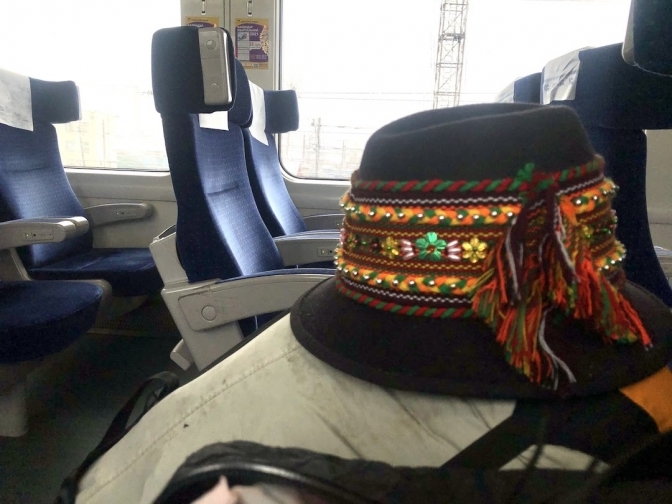
I recalled how at the beginning of this adventure, the night before I took the train to the wrong place, I was at Christmas Eve with the family of my friends Nicholas and Ina, who gave me the Hutsul hat. It was a different sort of celebration: In the Constantinople Orthodox faith and also in the Rome-loyal Greek Catholic faith predominant in Ukrainian Galicia, Advent is almost as serious a fast as Lent. And Christmas Eve, being the end of that fast, is a most serious fast: no meat, no alcohol--but still everyone gathers around the table for hours, directed by the hostess, Aunt Lyuba, who would tell us when to stop talking and to start singing.
A young family of carolers came in and played and sang for us – with such innocence and sweetness that months later, while waking or running or looking up from my coffee in a café I would still here their voices singing: Чудо, чудо! – повідають.» «Chudo, chudo povidayut,» or «miracle, miracle they will tell.»
If you are in need of inspiration, peace, or a creative reset, I think Galician Christmas, starting 7 January, could be your moment.
Note: During Christmas season in Ukraine, instead of saying «hello» you can say, «Христос Родився» (Khrystos Rodyvsya | «Christ is born!») and the reply is «Славіте Його» (Slavite Yoho | Glory to him!).
By Joe Lindsley (follow on Instagram or LinkedIn)
Coming soon: We’ll be posting other top ten list from natives and expats alike. And soon we will offer tips for excursions beyond Lviv. We welcome feedback and ideas via Facebook messenger.
To receive our weekly email digest of stories, please follow us on Substack.
Lviv Now is an English-language website for Lviv, Ukraine’s «tech-friendly cultural hub.» It is produced by Tvoe Misto («Your City») media-hub, which also hosts regular problem-solving public forums to benefit the city and its people.
